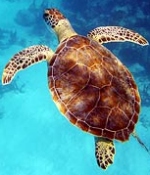Hotline to protect nesting turtles
 (CNS): While sea turtle remains a popular national dish in the Cayman Islands, the public is being asked to join a world wide effort to halt the decline of these endangered species. The Department of Environment (DoE) is appealing to the public to aid in the recovery of Cayman Islands sea turtle nesting populations by reporting turtle nests to a new DoE Turtle Hotline 938-NEST (938-6378) whenever sea turtle tracks or nests are found. The goal is to find all turtle nests and protect them from the time they are laid until they hatch two months later.
(CNS): While sea turtle remains a popular national dish in the Cayman Islands, the public is being asked to join a world wide effort to halt the decline of these endangered species. The Department of Environment (DoE) is appealing to the public to aid in the recovery of Cayman Islands sea turtle nesting populations by reporting turtle nests to a new DoE Turtle Hotline 938-NEST (938-6378) whenever sea turtle tracks or nests are found. The goal is to find all turtle nests and protect them from the time they are laid until they hatch two months later.
DoE Research Officer Dr Janice Blumenthal explained that during the turtle nesting season DoE staff and volunteers patrol beaches four days per week finding and protecting nests but they are not able to visit every beach every day so rely on the public to assist them.
She added, “While sea turtles spend the majority of their lives in the ocean, from May to November females make their way on shore to lay their eggs. On the beach, nesting turtles, turtle nests, and baby turtles are extremely vulnerable. We hope that with the new and easy to remember Turtle Hotline number, members of the public will be better able to assist in sea turtle conservation efforts.”
Data collected by DoE over the past decade show that Cayman Islands sea turtle nesting has begun to increase but many nests are in highly developed areas such as Seven Mile Beach. This makes nests susceptible to threats such as lights near the beach, beach driving, heavy equipment operation, bonfires, and poaching. The Turtle Hotline makes it possible for members of the public to help by alerting DoE when they spot turtle nests or see a nesting turtle or baby turtles in danger.
In addition to reporting nests, beachfront property owners and residents can assist by following the DoE’s guidelines for making beaches safe for turtles:
- Reduce beach lighting: turn off, redirect, or shield any lights that can be seen from the beach during the turtle nesting season (contact DoE for more information). Lights near the beach can lead baby turtles away from the sea and result in their death. Lighting may also deter nesting females from coming ashore.
- Remain quiet and stay at a distance if you see a nesting turtle. Flashlights, loud noises, or getting too close might cause the turtle to abandon her nesting attempt.
- Remove obstacles such as beach chairs and recreational equipment from the beach at night.
- Do not drive on the beach—this can crush turtle nests. Contact DoE before using beach cleaning machines or heavy equipment.
- Protect beach vegetation. Vegetation blocks light from buildings, stabilizes the beach, and encourages turtles to nest.
- Do not have bonfires on the beach in the summer—use a designated BBQ pit.
- Do not rake or cover turtle tracks. Department of Environment staff and volunteers use the tracks to find and protect nests.
- Call DoE’s Turtle Hotline if you find a turtle track, nest, or baby turtle.
- Remember that sea turtles are protected under Cayman Islands Law and turtle poachers face steep fines and imprisonment. If you see persons harming or taking sea turtles or their eggs call DoE Enforcement or the police (911).
Contact Janice Blumenthal at DoE for more information or to volunteer for the Marine Turtle Beach Monitoring Programme. DoE Turtle Hotline: 938-NEST. General: 949-8469. Emergencies: 916-4271 or 911. Email: DoE@gov.ky.
Category: Science and Nature


I encourage everyone to get involved with this vital part of Caymans history and get your kids involved as well so that they can see how important our fragile environment and its inhabitants are to our future.
It's hard to imagine what goes through the head of someone who puts a thumbs-down to such a blog. And so far there are five thumbs down.
Good! Let's do our best.